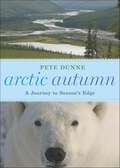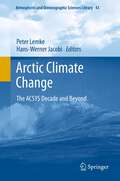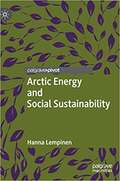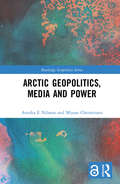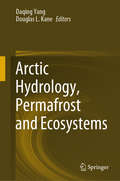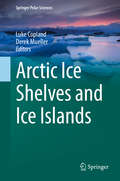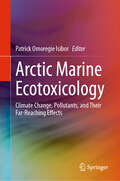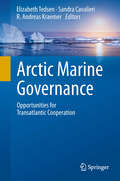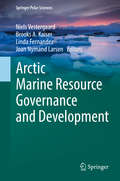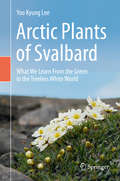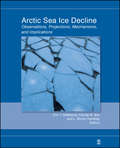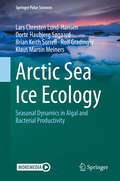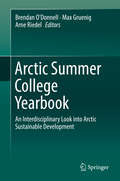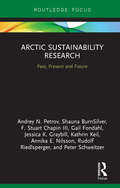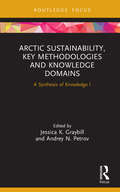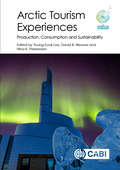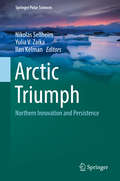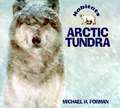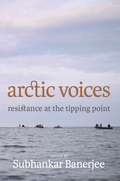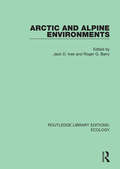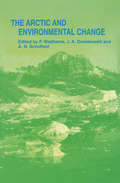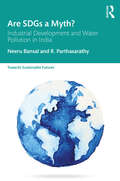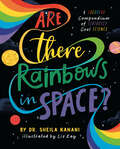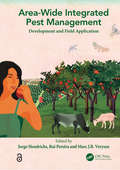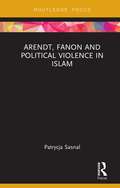- Table View
- List View
Arctic Autumn: A Journey to Season's Edge
by Pete DunneThe Arctic doesn't spring to mind when most people think about autumn. Yet in his continuing effort to invite readers' curiosity through unpredictability, Pete Dunne pairs the transitional season of autumn with this fragile environment in flux. The book begins on Bylot Island in Nunavut, Canada, at the retreating edge of the seasonal ice sheet, then moves to Alaska, where the needs of molting geese go head to head with society's need for oil. Then on to the Barren Lands of Canada and a search for the celebrated caribou herds that mean life and death for human and animal predators alike. A canoe trip down the John River is filled with memories, laughter, and contemplation. A caribou hunt with a professional trapper leads to a polemic on hunting. Dunne travels to an island in the Bering Sea, off the coast of Alaska, to look for rare birds and ponder the passionate nature of competitive bird listers. No trip to the Arctic would be complete without a trip to see polar bears, so Dunne and his wife visit Churchill, Manitoba, the polar bear capital of the world. These majestic but threatened creatures lead Dunne to think about his own life, our interactions with the natural world, and the importance of the Arctic, North America's last great wilderness.
Arctic Climate Change: The ACSYS Decade and Beyond (Atmospheric and Oceanographic Sciences Library #43)
by Hans-Werner Jacobi Peter LemkeThe Arctic is now experiencing some of the most rapid and severe climate change on earth. Over the next 100 years, climate change is expected to accelerate, contributing to major physical, ecological, social, and economic changes, many of which have already begun. Changes in arctic climate will also affect the rest of the world through increased global warming and rising sea levels. The volume addresses the following major topics: - Research results in observing aspects of the Arctic climate system and its processes across a range of time and space scales - Representation of cryospheric, atmospheric, and oceanic processes in models, including simulation of their interaction with coupled models - Our understanding of the role of the Arctic in the global climate system, its response to large-scale climate variations, and the processes involved.
Arctic Energy and Social Sustainability
by Hanna Lempinen<p>In recent years the Arctic has become the focus of political, popular and scholarly debates around the future of our world’s Energy. Increasing consumption, dwindling reserves, climate warming and developing technologies are expected to push energy-related activities ever further into the previously inaccessible north. Within this framework, energy in the Arctic is predominantly understood as synonymous with oil and gas production for international exports; meanwhile, any social sustainability concerns associated with energy-related developments remain largely neglected or reduced to regional socioeconomic concerns. <p>Lempinen adopts an alternative approach, exploring how energy and its societal aspects are defined and debated in the context of the circumpolar north. Combining an in-depth conceptual discussion on energy and the social dimension of sustainability with an empirical focus on the scientific and political “truths” produced about energy and society in the Arctic energyscape, this book is an enlightening read for students, scholars and professionals interested in issues related to energy and society in the Arctic or beyond.</p>
Arctic Geopolitics, Media and Power (Routledge Geopolitics Series)
by Miyase Christensen Annika Nilsson E.Arctic Geopolitics, Media and Power provides a fresh way of looking at the potential and limitations of regional international governance in the Arctic region. Far-reaching impacts of climate change, its wealth of resources and potential for new commercial activities have placed the Arctic region into the political limelight. In an era of rapid environmental change, the Arctic provides a complex and challenging case of geopolitical interplay. Based on analyses of how actors from within and outside the Arctic region assert their interests and how such discourses travel in the media, this book scrutinizes the social and material contexts within which new imaginaries, spatial constructs and scalar preferences emerge. It places ground-breaking attention to shifting media landscapes as a critical component of the social, environmental and technological change. It also reflects on the fundamental dilemmas inherent in democratic decision making at a time when an urgent need for addressing climate change is challenged by conflicting interests and growing geopolitical tensions. This book will be of great interest to geography academics, media and communication studies and students focusing on policy, climate change and geopolitics, as well as policy-makers and NGOs working within the environmental sector or with the Arctic region.
Arctic Hydrology, Permafrost and Ecosystems
by Daqing Yang Douglas L. KaneThis book provides a comprehensive, up-to-date assessment of the key terrestrial components of the Arctic system, i.e., its hydrology, permafrost, and ecology, drawing on the latest research results from across the circumpolar regions. The Arctic is an integrated system, the elements of which are closely linked by the atmosphere, ocean, and land. Using an integrated system approach, the book’s 30 chapters, written by a diverse team of leading scholars, carefully examine Arctic climate variability/change, large river hydrology, lakes and wetlands, snow cover and ice processes, permafrost characteristics, vegetation/landscape changes, and the future trajectory of Arctic system evolution. The discussions cover the fundamental features of and processes in the Arctic system, with a special focus on critical knowledge gaps, i.e., the interactions and feedbacks between water, permafrost, and ecosystem, such as snow pack and permafrost changes and their impacts on basin hydrology and ecology, river flow, geochemistry, and energy fluxes to the Arctic Ocean, and the structure and function of the Arctic ecosystem in response to past/future changes in climate, hydrology, and permafrost conditions. Given its scope, the book offers a valuable resource for researchers, graduate students, environmentalists, managers, and administrators who are concerned with the northern environment and resources.
Arctic Ice Shelves and Ice Islands (Springer Polar Sciences)
by Luke Copland Derek MuellerThis book provides an overview of the current state of knowledge of Arctic ice shelves, ice islands and related features. Ice shelves are permanent areas of ice which float on the ocean surface while attached to the coast, and typically occur in very cold environments where perennial sea ice builds up to great thickness, and/or where glaciers flow off the land and are preserved on the ocean surface. These landscape features are relatively poorly studied in the Arctic, yet they are potentially highly sensitive indicators of climate change because they respond to changes in atmospheric, oceanic and glaciological conditions. Recent fracturing and breakup events of ice shelves in the Canadian High Arctic have attracted significant scientific and public attention, and produced large ice islands which may pose a risk to Arctic shipping and offshore infrastructure. Much has been published about Antarctic ice shelves, but to date there has not been a dedicated book about Arctic ice shelves or ice islands. This book fills that gap.
Arctic Marine Ecotoxicology: Climate Change, Pollutants, and Their Far-Reaching Effects
by Patrick Omoregie IsiborThis book explores the fragile Arctic marine environment from the perspective of marine toxicology, shedding light on the intricate relationship between pollution, contaminants, and Arctic ecosystems. It examines the challenges of preserving this delicate habitat and the need to conserve the inherent lifeforms found there. The book introduces the unique characteristics of Arctic marine life. It delineates climate change and the effects of pollutants, analyzing their far-reaching impacts on the complex waters of Arctic marine toxicology. It also examines the regulatory frameworks required to safeguard these vulnerable ecosystems and presents case studies and ethical considerations. Fundamentals of Arctic Marine Toxicology: Climate Change, Pollutants, and Their Far-Reaching Effects is a valuable resource for researchers, policymakers, industry professionals, and environmental stewards. Its interdisciplinary approach encompasses climate change, conservation, biology, environmental science, and toxicology. It offers a holistic understanding of the Arctic's ecological intricacies and the challenges posed by anthropogenic disturbances caused by human activities motivated by economic gain. The book serves as a guide towards a future of eco-friendly innovations that align with environmental stewardship. It envisions a world of sustainable Arctic marine ecosystems achieved through responsible and sustainable practices.
Arctic Marine Governance: Opportunities for Transatlantic Cooperation
by Elizabeth Tedsen Sandra Cavalieri R. Andreas KraemerThe Arctic region plays an important role in regulating the world's climate and is also highly impacted by climate change, with average temperatures rising almost twice as fast as the rest of the world and sea ice melting much faster than previously predicted. These rapid changes will have significant impacts on human activity in the region and on the Arctic marine environment. This book draws on the results of the 2008-2009 Arctic TRANSFORM project, funded by the European Commission's Directorate General of External Relations, which engaged experts in a transatlantic discussion on the roles of the European Union and United States in light of the Arctic's changing climate and political and legal complexities. . The book addresses the significant changes and developments in the marine Arctic, with descriptions and recommendations reflecting the current governance environment. A comprehensive overview of environmental governance and sustainable development in the Arctic is created. Chapters explore impacts and activities by sector, looking at fisheries, shipping, and offshore hydrocarbon in the Arctic, and at policy options and strategies for improving marine governance in the region. A particular focus is given to the roles of the European Union and United States and opportunities for cooperation to enhance Arctic environmental governance. .
Arctic Marine Resource Governance and Development (Springer Polar Sciences)
by Joan Nymand Larsen Niels Vestergaard Brooks A. Kaiser Linda FernandezThis book is based on presentations from the Conference ‘Arctic Marine Resource Governance’ held in Reykjavik Iceland in October 2015. The book is divided into four main themes: 1. Global management and institutions for Arctic marine resources 2. Resource stewards and users: local and indigenous co-management 3. Governance gaps in Arctic marine resource management and 4. Multi-scale, ecosystem-based, Arctic marine resource management’.<P><P> The ecosystem changes underway in the Arctic region are expected to have significant impacts on living resources in both the short and long run, and current actions and policies adopted over such resource governance will have serious and ultimately irreversible consequences in the near and long terms.
Arctic Plants of Svalbard: What We Learn From the Green in the Treeless White World
by Yoo Kyung LeeThe Arctic is a special world. The Arctic Ocean is covered by white sea ice, and its margins are surrounded by bare terrestrial regions, known as tundra. Tundra is a cold and dry environment without trees, but even in the absence of trees, tundra plants such as dwarf shrubs, grasses, herbs and moss support the harsh environment by providing sustenance and shelter. This book introduces representative arctic plants and their function in Svalbard, revealing the unique tundra ecosystem, and discussing the direct and indirect effects of climate change in the Arctic.
Arctic Sea Ice Decline: Observations, Projections, Mechanisms, and Implications
by Cecilia M. Bitz L. Bruno Tremblay Eric T. DeweaverPublished by the American Geophysical Union as part of the Geophysical Monograph Series, Volume 180.This volume addresses the rapid decline of Arctic sea ice, placing recent sea ice decline in the context of past observations, climate model simulations and projections, and simple models of the climate sensitivity of sea ice. Highlights of the work presented here includeAn appraisal of the role played by wind forcing in driving the decline;A reconstruction of Arctic sea ice conditions prior to human observations, based on proxy data from sediments;A modeling approach for assessing the impact of sea ice decline on polar bears, used as input to the U.S. Fish and Wildlife Service's decision to list the polar bear as a threatened species under the Endangered Species Act;Contrasting studies on the existence of a "tipping point," beyond which Arctic sea ice decline will become (or has already become) irreversible, including an examination of the role of the small ice cap instability in global warming simulations;A significant summertime atmospheric response to sea ice reduction in an atmospheric general circulation model, suggesting a positive feedback and the potential for short-term climate prediction.The book will be of interest to researchers attempting to understand the recent behavior of Arctic sea ice, model projections of future sea ice loss, and the consequences of sea ice loss for the natural and human systems of the Arctic.
Arctic Sea Ice Ecology: Seasonal Dynamics in Algal and Bacterial Productivity (Springer Polar Sciences)
by Lars Chresten Lund-Hansen Dorte Haubjerg Søgaard Brian Keith Sorrell Rolf Gradinger Klaus Martin MeinersThe book on sea ice ecology is the ecology of sea ice algae and other microorganism as bacteria, meiofauna, and viruses residing inside or at the bottom of the sea ice, called the sympagic biota. Organisms as seals, fish, birds, and Polar bears relies on sea ice but are not part of this biota. A distinct feature of this ecosystem, is the disappearance (melt) every summer and re-establishing in autumn and winter. The book is organized seasonally describing the physical, optical, biological, and geochemical conditions typical of the seasons: autumn, winter, and spring. These are exemplified with case studies based on author’s fieldwork in Greenland, the Arctic Ocean, and Antarctica but focused on Arctic conditions. The sea ice ecosystem is described in the context of climate change, interests, and effects of a decreasing summer ice extent in the Arctic Ocean. The book contains an up to date description of most relevant methods and techniques applied in sea ice ecology research.This book will appeal to university students at Masters or PhD levels reading biology, geosciences, and chemistry.
Arctic Summer College Yearbook: An Interdisciplinary Look into Arctic Sustainable Development
by Brendan O'Donnell Max Gruenig Arne RiedelThis book highlights both the diversity of perspectives and approaches to Arctic research and the inherent interdisciplinary nature of studying and understanding this incomparable region. The chapters are divided into four liberally-defined sections to provide space for dynamic interpretation and dialogue in search of sustainable solutions to the issues facing the Arctic. From governance to technology, scientific research to social systems, human health to economic development, the authors discuss fundamental questions while looking toward the Arctic's future. Whether the reader is well-versed in the history and complexity of Arctic policy or looking for an insightful introduction to the vast world of Arctic research, everyone will find answers that lead to new questions and even more discoveries in these pages, laying the foundation for tomorrow's discussion on the future of the Arctic. The Arctic's unique geographic and political characteristics pose questions for the international community, indigenous peoples, and economic interests not easily answered through traditional concepts. To that end, the Arctic Summer College has been engaging leading professionals, students, scholars, and policy makers from across the globe to exchange ideas and support further investigation into the Arctic. A joint venture between Ecologic Institute US and Ecologic Institute Berlin (Germany), the College participates at the annual Arctic Circle Assembly in Reykjavik, Iceland, and continues to be at the forefront of international collaboration in this critical area of economic, political, environmental, and humanitarian development.
Arctic Sustainability Research: Past, Present and Future
by F. Stuart Chapin III Kathrin Keil Annika E. Nilsson Gail Fondahl Andrey N. Petrov Jessica K. Graybill Peter Schweitzer Rudolf Riedlsperger Shauna BurnsilverThe Arctic is one of the world’s regions most affected by cultural, socio-economic, environmental, and climatic changes. Over the last two decades, scholars, policymakers, extractive industries, governments, intergovernmental forums, and non-governmental organizations have turned their attention to the Arctic, its peoples, resources, and to the challenges and benefits of impending transformations. Arctic sustainability is an issue of increasing concern as well as the resilience and adaptation of Arctic societies to changing conditions. This book offers key insights into the history, current state of knowledge and the future of sustainability, and sustainable development research in the Arctic. Written by an international, interdisciplinary team of experts, it presents a comprehensive progress report on Arctic sustainability research. It identifies key knowledge gaps and provides salient recommendations for prioritizing research in the next decade. Arctic Sustainability Research will appeal to researchers, academics, and policymakers interested in sustainability science and the practices of sustainable development, as well as those working in polar studies, climate change, political geography, and the history of science.
Arctic Sustainability, Key Methodologies and Knowledge Domains: A Synthesis of Knowledge I (Routledge Research in Polar Regions)
by Dutton Andrey N. Petrov Jessica K. GraybillThis book provides a first-ever synthesis of sustainability and sustainable development experiences in the Arctic. It presents state-of-the-art thinking about sustainability for the Arctic from a multi-disciplinary perspective. This book aims to create a comprehensive, integrative knowledge base for the assessment of Arctic sustainability for countries such as the United States, Canada, Greenland, Iceland, Norway, Sweden, Finland, and Russia, alongside emerging ideas about sustainable development in the Arctic. These ideas relate to understanding how a community’s geography matters in determining the required sustainability efforts, decolonial thinking for building sustainability that is crafted by and for local and Indigenous communities, and the idea of polycentrism (i.e., that the paths toward sustainability differ among places and communities). This volume also highlights the recent thinking about sustainability and resilience over the past decade for the rapidly changing Arctic region. With patterns of thinking drawn from economic, social, environmental, community, and other components of sustainability; observations and monitoring; engagement of Indigenous knowledge; and integration with policy and decision making, the book helps us understand the complexity and interconnectedness of current Arctic transformations in a more comprehensive way.
Arctic Tourism Experiences
by Young-Sook Lee David B. Weaver Nina K. PrebensenAn exploration of Arctic tourism, focusing on tourist experiences and industry provision of those experiences; this is the first compilation to concentrate on the fundamental essence of the Arctic as being a geographical periphery, but also an experiential core that offers peak tourism experiences. Part 1 investigates the depth and dimensions of tourist experiences in the Arctic. Chapters examine the essence of diverse peak experiences and delve into the factors that give rise to these experiences. Part 2 considers the links between these core experiences and the tourism industry that seeks to sustain itself by facilitating such satisfying outcomes.
Arctic Triumph: Northern Innovation and Persistence (Springer Polar Sciences)
by Ilan Kelman Nikolas Sellheim Yulia V. ZaikaThis book approaches the challenges the Arctic has faced and is facing through a lens of opportunity. Through pinpointed examples from and dealing with the Circumpolar North, the Arctic is depicted as a region where people and peoples have managed to endure despite significant challenges at hand. This book treats the ‘Arctic of disasters’ as an innovated narrative and asks how the ‘disaster pieces’ of Arctic discourse interact with the ability of Arctic peoples, communities and regions to counter disaster, adversity, and doom. While not neglecting the scientifically established challenges associated with climate change and other (potentially) disastrous processes in the north, this book calls for a paradigm shift from perceiving the ‘Arctic of disasters’ to an ‘Arctic of triumph’. Particular attention is therefore given to selected Arctic achievements that underline ‘triumphant’ developments in the north, even when Arctic triumph and disaster intersect.
Arctic Tundra
by Michael H. FormanThousands of complex animal and plant species make their home in the Arctic tundra. By looking at small, specialized habitats, this series brings to life the multiple complexities present in even the most common or simple environments.
Arctic Voices: Resistance at the Tipping Point
by Subhankar BanerjeeA pristine environment of ecological richness and biodiversity. Home to generations of indigenous people for thousands of years. The location of vast quantities of oil, natural gas and coal. Largely uninhabited and long at the margins of global affairs, in the last decade Arctic Alaska has quickly become the most contested land in recent US history. World-renowned photographer, writer, and activist Subhankar Banerjee brings together first-person narratives from more than thirty prominent activists, writers, and researchers who address issues of climate change, resource war, and human rights with stunning urgency and groundbreaking research. From Gwich'in activist Sarah James's impassioned appeal, "We Are the Ones Who Have Everything to Lose," during the UN Climate Conference in Copenhagen in 2009 to an original piece by acclaimed historian Dan O'Neill about his recent trips to the Yukon Flats fish camps, Arctic Voices is a window into a remarkable region.Other contributors include Seth Kantner, Velma Wallis, Nick Jans, Debbie Miller, Andri Snaer Magnason, George Schaller, George Archibald, Cindy Shogan, and Peter Matthiessen.
Arctic and Alpine Environments (Routledge Library Editions: Ecology #6)
by Jack D. Ives; Roger G. BarryOriginally published in 1974, Arctic and Alpine Environments examines, the relatively simple ecosystems of arctic and alpine lands that still occupy extensive areas little disturbed by modern technology. The book argues that there is a necessity for carefully controlled development of the resources of these regions and suggests that there is a risk of irreversible disturbance without full understanding of these regions. This book provides a detailed documentation of cold-stressed arctic and alpine terrestrial environments and systematically deals with the present and past physical environment – climate, hydrology and glaciology; biota – treeline, vegetation, vertebrate zoology, and historical biogeography; abiotic processes – geomorphological and pedological and the role of man – bioclimatology, archaeology and technological impact, including radioecology. The book will appeal to academics and students of environmental and biological science, as well as providing a significant source for conservationists’, government agencies and industrial organizations.
Arctic and Environmental Change
by J. A. DowdeswellThis timely book presents a wide-ranging review of Arctic environmental change in response to global warming, and gives a broad insight into the transformation of the Arctic which we can expect during the next century. It is in high northern latitudes that we can expect to observe global warming at its most powerful, making it a natural laboratory where climate changes and their impacts can be monitored and studied more readily than elsewhere in the world. Fourteen authoritative reviews cover the predictions of warming rates by General Circulation Models; variabilities in atmospheric circulation and moisture flux; the dynamics of the polar vortex in the Arctic and its role in ozone loss; the countervailing influence of air pollution in reducing solar irradiance; and the impact of climatic change on Arctic terrestrial and marine ecosystems. Also detailed are the thermohaline circulation of the ocean, the extent and thickness of sea ice, the sizes of glaciers and ice sheets, and the extent of permafrost. Moving to past changes, the records from Greenland ice cores and deep ocean drilling are reviewed for what they tell us about past climates and glaciation in the Arctic., The book paints a vivid and disturbing picture of the enhanced warming that can be expected in the Arctic relative to lower latitudes, and of the major impacts that this will have on the northern cryosphere. It will be an invaluable reference for anyone seeking a greater understanding of the factors and processes affecting the arctic environment, which may ultimately have a major impact on global climatic change.
Are SDGs a Myth?: Industrial Development and Water Pollution in India (Towards Sustainable Futures)
by R. Parthasarathy Neeru BansalThis book discusses the continued emphasis on development gains in India’s national policies and its quest to meet sustainable development goals. It offers an analysis of the laws and infrastructure for environment protection in the country and their ineffectiveness in dealing with the water pollution which has had dire consequences on India’s ecological landscape. The book, while highlighting the need and importance of industrial development, argues for sustainable measures to moderate and monitor such developmental efforts in light of severe environmental degradations. Focusing on the state of Gujarat, it looks at published and un-published data on industrial development and water pollution levels and data obtained via applications filed under the Right to Information Act. It also offers a detailed account of the concentration of red industries which release the most hazardous pollutants and their effects on the environment. The authors look at the data from a theoretical and empirical perspective, offering insights into how the checks and balances levied by the state have been violated. They highlight the patterns and trends which emerge from the study of these developmental efforts and underline the need to improve the effectiveness of policy instruments, and the need to diversify the existing mechanisms. The book will be of great interest to students and researchers of environment and development studies, public policy, sociology, law and governance, human ecology and economics.
Are There Rainbows in Space?: A Colorful Compendium of Seriously Cool Science
by Sheila KananiWhat color is a polar bear under its fur? How do flamingos turn pink? What is a blue moon? Find the answers to all these fun questions and much more in this fact-filled adventure into the colorful world around us!The science of colors is hard at work all the time—from ultraviolet light to the baby blue tint of the sky. Readers will learn tons of interesting scientific facts about color and its whys and hows—like why blood is red, how hippos keep cool, and how some animals can change color to hide from predators. Bursting with incredible illustrations and some seriously cool science, this book is sure to dazzle both nature lovers and reluctant readers alike.
Area-wide Integrated Pest Management: Development and Field Application
by Jorge Hendrichs; Rui Pereira; Marc J.B. VreysenOver 98% of sprayed insecticides and 95% of herbicides reach a destination other than their target species, including non-target species, air, water and soil. The extensive reliance on insecticide use reduces biodiversity, contributes to pollinator decline, destroys habitat, and threatens endangered species. This book offers a more effective application of the Integrated Pest Management (IPM) approach, on an area-wide (AW) or population-wide (AW-IPM) basis, which aims at the management of the total population of a pest, involving a coordinated effort over often larger areas. For major livestock pests, vectors of human diseases and pests of high-value crops with low pest tolerance, there are compelling economic reasons for participating in AW-IPM. This new textbook attempts to address various fundamental components of AW-IPM, e.g. the importance of relevant problem-solving research, the need for planning and essential baseline data collection, the significance of integrating adequate tools for appropriate control strategies, and the value of pilot trials, etc. With chapters authored by 184 experts from more than 31 countries, the book includes many technical advances in the areas of genetics, molecular biology, microbiology, resistance management, and social sciences that facilitate the planning and implementing of area-wide strategies. The book is essential reading for the academic and applied research community as well as national and regional government plant and human/animal health authorities with responsibility for protecting plant and human/animal health.
Arendt, Fanon and Political Violence in Islam (Routledge Research on Decoloniality and New Postcolonialisms)
by Patrycja SasnalThis book looks at contemporary political violence, in the form of jihadism, through the lens of a philosophical polemic between Hannah Arendt and Frantz Fanon: intellectual representatives of the global north and global south. It explores the relationship of Arendt’s thought, mostly as expressed in On Violence (1969), to Fanon’s The Wretched of the Earth (1961) and the transposition of that relationship to the contemporary phenomenon of violent Islamic extremism. The book reveals a greater commonality between Fanon and Arendt as well as the universal function of jihadism that satisfies the conditions for political violence, as categorized by Fanon in the global south and Arendt in the global north. Read in tandem, Arendt and Fanon help uncover the fundamental problems of our European, American, Middle Eastern and African political systems as well as north-south relations. By studying political theory, the book finds global political commonalities in a postcolonial reality. Written in an accessible style, this book will be of great interest to undergraduates and graduates in philosophy, political sciences and international relations (IR), sociology and Middle Eastern studies as well as scholars and professionals interested in radicalization; violent extremism; and the foreign policies of European, Middle Eastern and African countries.
